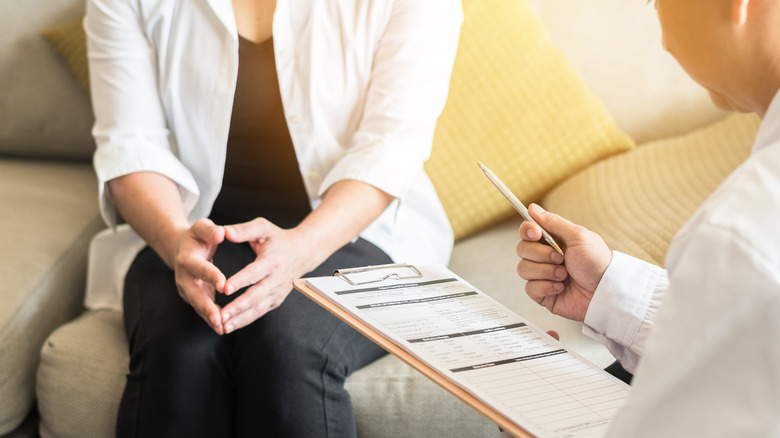Amy Schumer's Endometriosis Diagnosis Explained
On Sunday, Amy Schumer publicly shared that she recently had surgery for endometriosis (via People). "If you have really painful periods, you may have #endometriosis," she wrote on her Instagram account next to a photo of herself in a hospital gown. The post also contained a video of Schumer filmed by her husband. "So, it's the morning after my surgery for endometriosis and my uterus is out," she said in the video. "The doctor found 30 spots of endometriosis that he removed. He removed my appendix because the endometriosis had attacked it."
Schumer's post was received by thousands of well-wishes from friends and fans. "Oh, my goodness, 30?!" actress Debra Messing said. "So happy they are gone, and you won't have that pain anymore. Heal well Am!" Television host and model Padma Lakshmi wrote, "Thank you so much for sharing your endo story. Over 200 million women worldwide suffer with this. Hope you feel better soon! @endofound." Schumer noted in her video that she is sore from the surgery and is currently experiencing "gas pains."
Endometriosis affects 1 in 10 women
Endometriosis is a chronic condition that is often painful and can cause fertility issues in women. The inner lining of the uterus, called the endometrium, is what is shed when a person is on their period. When someone has endometriosis, tissue similar to the endometrium grows outside of the uterus (via Medical News Today). This tissue can develop on the ovaries, fallopian tubes, vagina, or intestines.
"Endometriosis is a condition where cells, like the ones in the lining of the womb, are found elsewhere in the body," Emma Cox, CEO of charity Endometriosis UK, told Women's Health. "Each month, like the cells in your womb, these endometriosis cells build up, then break down and bleed. But, unlike the cells in the womb that leave the body as a period, this blood has no way of escaping." The result of this blood not being able to leave the body is pain, inflammation, and new scar tissue, which can be extremely painful. "It can be a debilitating condition," Cox said.
This condition is most common in women aged 30 to 40, but it can occur in people as young as 15 years old.
Endometriosis can cause fertility issues
Along with pain, one of the most serious effects of endometriosis is its impact on fertility. According to WebMD, this condition is the leading cause of infertility in the United States. An estimated two out of every five women who have trouble conceiving also have endometriosis. There are many reasons this condition may affect fertility. The tissue outside of the uterus may grow on your ovaries and make it impossible for your eggs to release. Tissue on the fallopian tubes can make it difficult for sperm to enter or for an egg to slide down to your uterus.
Endometriosis can also affect your hormones and even cause your body's immune system to attack an embryo. The condition can make sex painful, which may lead you to have intercourse less often. It can also cause stress, anxiety, and depression. These factors may affect your relationship, sex life, and ability to get pregnant. According to Johns Hopkins Medicine, infertility may be temporary in mild to moderate cases of endometriosis. In severe cases, a woman may be infertile for her entire life.
It often takes a long time to diagnose
One of the reasons endometriosis is such a debilitating condition is that it can take years to diagnose. Many women suffer from it for a long time before receiving treatment. One 2013 study found that on average, it took 6.7 years to get an accurate diagnosis of endometriosis (via the National Center for Biotechnology Information). Pelvic pain is normal for many women during their periods, so they or a doctor may not think anything is abnormal if the pain becomes more severe.
Pain is also considered a normal part of being a woman, which can lead to many conditions being underdiagnosed. "The normalization of painful symptoms is a huge issue. And there's still a very low recognition of endometriosis at the general practitioner level. That's where a young woman would go with her painful symptoms," Lone Hummelshoj, chief executive of the World Endometriosis Society and the World Endometriosis Research Foundation, told Forbes.
If you believe you have endometriosis, it is important that you advocate for yourself when talking to a doctor. If you feel like your doctor isn't taking your symptoms seriously, consider moving to a new practitioner.
Pain is only one symptom of endometriosis
Endometriosis has many symptoms. It is important to be aware of them, especially if you suspect you have this condition. The most common symptom is pain in the pelvic area (via Mayo Clinic). While some pain is common for people during their periods, those with endometriosis will often experience severe pain during and outside of their menstrual cycles.
"Mild discomfort with periods may be normal, but pain that stops [you] from working, going to school, or other daily activities is not normal and should be evaluated by a gynecologist," Khara Simpson, M.D., assistant professor at the Johns Hopkins department of obstetrics and gynecology, told Self. Other common symptoms include pain during or after sex, pain while going to the bathroom, heavy bleeding during periods, bleeding between periods, and infertility. People with endometriosis may also have fatigue, diarrhea, constipation, bloating, or nausea.
The only way to definitively diagnose endometriosis is with a surgical procedure called a laparoscopy (via Johns Hopkins Medicine). It is minimally invasive and involves a thin tube with a camera being inserted into the abdomen, which allows a doctor to look at the severity of the condition first-hand.
There are treatment options for endometriosis
According to Healthline, there is no cure for endometriosis. However, there are many ways to manage your symptoms once you have been diagnosed. Over-the-counter pain medications can manage pain in mild cases. Hormone therapy or birth control may reduce pain from this condition, especially the pain that comes when you are on your period.
In more severe cases, surgery may be necessary. For women who experience severe pain that can't be fixed with medication, a surgical procedure to remove endometrial tissue is used. This procedure is ideal for women who want to get pregnant because it does not destroy the reproductive organs. Women who do not want to get pregnant can get a total hysterectomy, which removes the uterus and cervix. A doctor performing this surgery may also remove the ovaries.
Endometriosis is a common and debilitating disease for many women. Talk to your doctor if you are experiencing severe pelvic pain, abnormal periods, or any of the other symptoms mentioned above. Once endometriosis has been diagnosed, it is much easier to treat.






